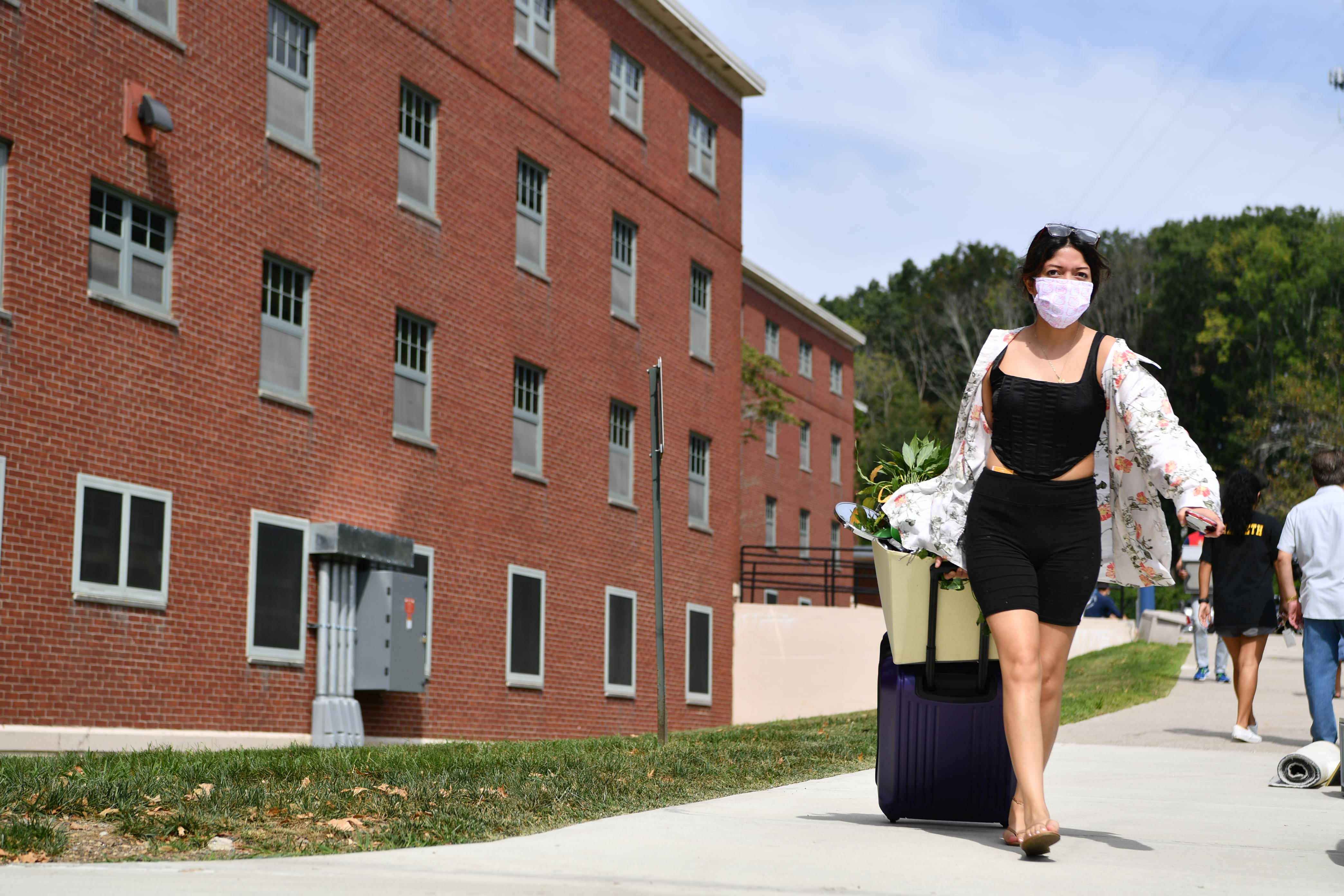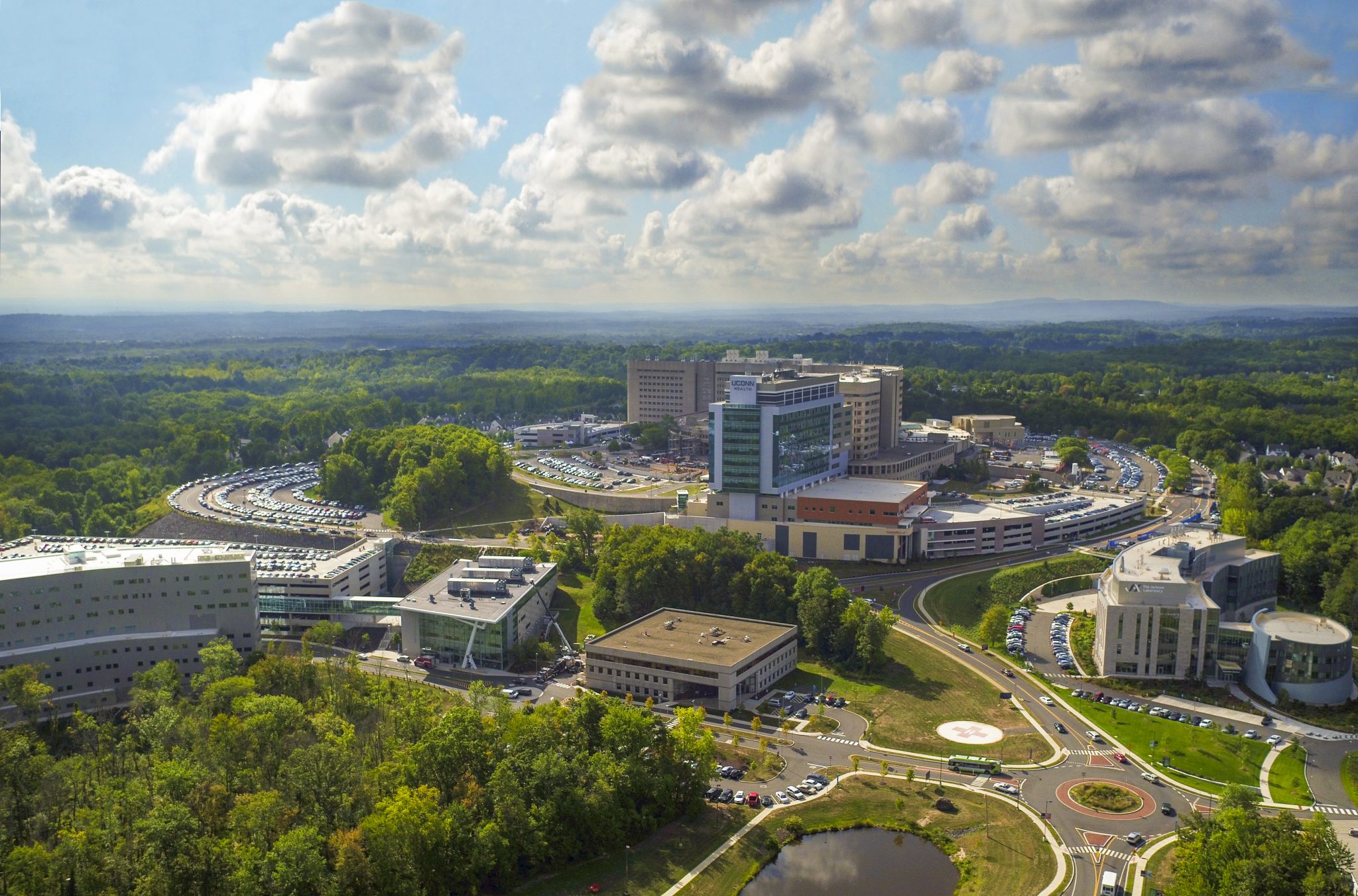What do HIV, nutrition, substance use, and weight management have to do with COVID-19?
They’re all areas where behavioral, social, and health researchers at UConn have developed particular expertise – and that expertise has helped to create science and evidence-informed recommendations for the University as it embarks on the Fall semester amidst the ongoing coronavirus pandemic.
“It became clear in the spring that how we approached the fall semester was a grand challenge and that a collective effort was needed to figure out how best to reopen our campuses,” says Amy Gorin, a professor in UConn’s Department of Psychological Sciences and director of the Institute for Collaboration on Health, Intervention, and Policy, also known as InCHIP.
InCHIP is an interdisciplinary research institute with a network of more than 400 affiliates from diverse fields of study. From medicine to economics, nursing to engineering, communication to kinesiology, InCHIP researchers work together to create and disseminate new knowledge and theoretical frameworks in the areas of health behavior and health behavior change at individual, environmental, social, and policy levels.
When it came to COVID, Gorin said, InCHIP researchers wanted to bring the lessons they had learned from their extensive work in other health domains to the complex challenges that the University faces in reopening.
“A lot of the questions that we’re grappling with are in the wheelhouse of our social and behavioral scientists,” she says. “Things like, how do you get people to engage in health behaviors? How do you communicate about health risk and threat? How do you reduce harm? When you’re helping people to change their behaviors over time, sometimes those changes aren’t particularly pleasant in the moment, or they don’t have an immediate payoff, but they are essential to long-term success.”
InCHIP mobilized quickly after the close of the spring semester to form a 19-member Social and Behavioral Sciences COVID-19 Workgroup comprised of faculty, administrators, staff, and student representatives. The group was charged with leveraging its members’ collective expertise to inform discussions with UConn’s leadership about how to design a safe campus reopening.
“It was a partnership that emerged between UConn leadership and InCHIP and many other units on campus, notably Dean of Students Elly Daugherty and her wonderful team in Student Affairs, to develop connections between our researchers and the folks who would be implementing programs and policies on the ground,” says Gorin.
Subgroups took on different tasks, all using applied behavioral science methods to gather data and formulate recommendations that were then shared with the University’s administration. They focused a lot of their efforts on community engagement – with particular attention to undergraduate students, conducting a Thoughtexchange crowdsourcing survey with 2,703 undergrads to assess their hopes, ideas, and questions about the fall semester.
One of our guiding principles in all of this was that we need to take a community-based, participatory approach to this challenge. So, it’s critical that we hear from students, faculty, and staff about their questions and concerns. A lot of the focus was on our undergraduates, since their daily life and their experience with the campus and the University was going to be changing so drastically. — Amy Gorin, InCHIP Director
“One of our guiding principles in all of this was that we need to take a community-based, participatory approach to this challenge,” Gorin says. “So, it’s critical that we hear from students, faculty, and staff about their questions and concerns. A lot of the focus was on our undergraduates, since their daily life and their experience with the campus and the University was going to be changing so drastically.”
Gorin says the Thoughtexchange showed that there isn’t one, universal response when it comes to reopening and returning to campus.
“We had students who felt very strongly about campus reopening and wanting to have that typical college experience at any cost,” she says, “and then a large group wanted to make sure that there was flexibility – that they could participate online, take all of their classes remotely, interact with their peers virtually. They wanted to do that to keep themselves, their families, and even their professors, safe.”
The working group also conducted a virtual Ideas Lab – a five-week workshop that called on the collective expertise of 110 staff, faculty, undergraduate and graduate students to adopt, adapt, and create solutions that might work for UConn. Suggestions for solutions as varied as practical foot-activated door openers and signage to reimagined social connections and a public health communication campaign were the product of that effort.
The working group later conducted a series of focus groups with students to get their perspective on some of the announced reopening plans and also developed a series of resources to help instructors identify students who might be struggling and to help students and other members of the UConn community connect with physical and mental wellness resources available to them. The working group also conducted a Thoughtexchange of Mansfield residents, working with the mayor and local leaders, to engage the broader community as students return to Storrs.
The workgroup collaborated with colleagues in Student Affairs and University Communications to develop a pledge for all members of the UConn community to make, in which each person commits to adhere to essential prevention behaviors and medical management recommendations and to conduct themselves as allies for individuals and communities who have been vulnerable to bias, discrimination, and stigma, both during the pandemic and beyond.
That pledge – the UConn Promise – is, at its core, a promise to help keep the community safe and the campus open, says Gorin.
“Creating a new set of norms on campus is imperative,” she says, “and we all need to make a commitment to consistently engage in prevention behaviors to minimize the spread of COVID.”
Another recommendation from the working group, originating in the Ideas Lab, was the creation of a peer support program that engages students as ambassadors from a broad array of backgrounds, interests, and social groups on campus who will interact with their fellow students in-person, virtually, and on social media and encourage them to adhere to COVID-19 guidelines in ways that are motivational, supportive, and nonjudgmental.
“This is essentially training students to have language to talk to their peers about COVID-related behavior change,” says Gorin, “and specifically giving suggestions on how to deal with folks who maybe aren’t embracing the behavioral changes that we all need to do to keep our campus open – things like wearing masks, and keeping social gatherings small.”
The program is being spearheaded by Jenn Longa in Student Affairs, and over 85 students have expressed interest in being trained as ambassadors.
While the formal work of the working group concluded with a final report issued at the end of July, members of the group continue to work on various issues, and the group as a whole is ready to come back together as the semester progresses if issues arise where they might be able to assist. Gorin says behavioral fatigue is a real concern and that continued community engagement, especially with students, is needed.
“We heard from a lot of students a real sadness for what they had missed out on in the spring and what they were afraid they were going to miss out on in the fall,” Gorin says. “College is an important developmental stage for our students. It’s quite normal to want to have what we all think of as a typical college experience, and that’s just not possible right now.”
She says the group and University leaders need to keep hearing from students, faculty, staff, and the community about what’s working, and what isn’t.
“From my perspective, the planning process for the fall semester has been science-based and evidence-informed,” she says, “but it’s an open question what will happen when campus reopens. We all need to commit to the behaviors that are under our control in order to keep each other healthy. To have whatever sense of normalcy we can achieve really is dependent on everyone’s collective action.”
For more information about UConn’s reopening plans, visit reopen.uconn.edu.



